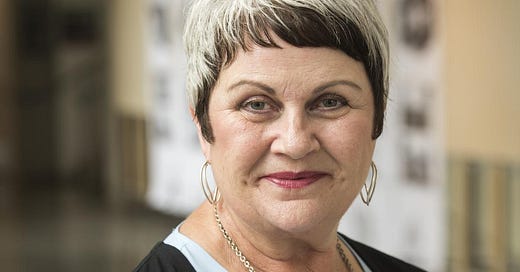“Well, I am from Georgia, but I am Armenian,” said the jolly, middle-aged woman, who readied to cut my hair.
“Oh. I’m Jewish,” I said. “Congrats on your genocide.”
She smiled. “Thank you.”
In 1988 Ovsanna Avagyan was a 24 year-old piano teacher living in Georgia. She lived with her husband, her 10-year-old daughter, and her dog named Chalo.
"Chalo was not my dog. Chalo belonged to my husband,” she said as she sprayed my hair with water.
Ovsanna had a pleasant life as a piano teacher. She found it rewarding, building relationships with her students and getting to watch them grow.
“I always wondered what happened to them. I had a student named Gayane. She was so talented. I teach her Fur Elise when she was four,” Ovsanna beamed. “I loved piano. My biggest joy,” she said while I watched her in the mirror.
“But Georgia had many problems. I wanted to give to my daughter a better life.”
Ovsanna’s cousin, in Queens, arranged for a tourist visa. The two of them scraped together the little money they had, and leaving behind both a job and a husband, Ovsanna and her daughter hopped on the next flight to the U.S.
“I was sad to leave my husband. I did love him”
“What about Chalo?”
“No. I hate Chalo.”
“Did you speak English?”
“No. Not at all. And all the good jobs required it. And the immigrant resources in New York prioritized Jews.”
I apologized.
Four months later, Ovsanna moved from Queens to Los Angeles, which holds the second largest population of Armenians, only second to Armenia.
Living in a studio apartment with her cousin and her daughter, Ovsanna found jobs cleaning toilets, taking care of children, and washing dishes at the local mediocre bakery.
“Always stale,” she recalled. “But I had not many options. My English wasn’t good to teach piano,” she said, before adding, in many words, that LA has too much competition due to the city’s oversupply of failed musicians.
From her three jobs, Ovsanna eventually saved enough money that she and her daughter could move into a studio apartment. But Ovsanna wanted more and needed to learn English.
“I didn’t have time for school, and there was no internet. I studied subtitles on movies and my daughter put sticky notes all over the apartment to help. Above the sink my daughter wrote: ‘Yes sirum yem lvanal spask’y’ and the English ‘I like washing the dishes.’”
“I like?” I asked.
“What?” she asked.
“Your daughter taught you ‘I like washing the dishes’. Instead of ‘I am washing the dishes’. Isn’t that...weird?”
“Hm,” she looked at me. “That is weird.”
But she didn’t like washing dishes, neither at home, nor at the bakery, and over time, as her English improved, Ovsanna searched for another job.
She wanted to work with people.
“In Georgia, my mother always had me cut my sister’s hair.”
“Were you good?”
“It didn’t matter. My sister was very ugly.” She laughed. “But no, I was not good then.”
Ovsanna enrolled in cosmetology school and quickly landed a role working at an Armenian-owned barber.
“Many of my clients spoke English. So, over time, I got much better.” She cut some hair off the top of my head.
“What about your husband? Where was he?”
“He moved here in...maybe...1999. But I was different person then.” She switched to clippers. “He didn’t have friends and just sit at home all day and then was...uh...how do you say...,” she yelled in Armenian to a woman in the back of the salon.
The woman yelled back, “Depressed.”
“Yes, depressed,” Ovsanna repeated. “Some words I still don’t remember well.”
She finished buzzing the sides.
“So we are divorced. And I am married again.” She pointed to a picture on the counter. He was a handsome, 60something-year-old man. He looked tall.
“12 years. He is my prince charming. I am very lucky to have found him. I always tell people, I had love with Georgian husband and now I have love with American husband.”
I didn’t understand the significance.
“Is America’s recognition of the genocide a big deal?” I asked.
“It is so important. It has been like we did not matter.” She paused as she tapped the scissors to my scalp. “2 million people,” she said, looking up to a Greek Orthodox cross on the wall. “So many horrible stories my grandmother would always tell me. And with Erdoğan,” she spat on the ground in the way that mother-country people do, as she said his name. “Maybe also America will help Georgia to recognize.”
“Yeah. I guess...we Jews are lucky. The Holocaust gets all the attention.”
She nodded.
“The MVP of genocides,” I said.
“MVP?”
“Uh...” I regretted my idiom as I searched for simple sports words. “It means most valuable player. Like...the best of the best.”
“Ah yes. Holocaust is best genocide.”
I allowed that to hold the room.
“What about your daughter, what does she do now?”
“Oh. You want to meet my daughter?” She glowed. “Sorry but she is married.”
“No, I’m gay. But. I’m happy for her.”
“Oh. You should go to Russia. So many gays.”
She obviously hadn’t spent time around LA.
“Now, I am a grandmother,” she said as she wiped the leftover pieces of hair off my shoulders.
“Oh. Congrats. That’s awesome.” I looked at my hair in the mirror. It looked good. Not like her sister.
“Yes. My granddaughter is two years old. I am going to teach her piano.”
—
My next piece will be about doing Ayahuasca.
It sucked.
Subscribe if you want me to send it along.





The best genocide humor
Literally the best opening I’ve read in forever